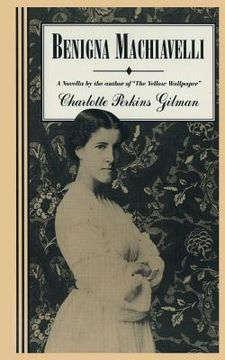Reseña del libro "Benigna Machiavelli (en Inglés)"
Benigna Machiavelli has never before been published in its entirety in book form. It was first published by Charlotte Perkins Gilman in The Forerunner (Vol. 5, 1914), a magazine which she wrote, edited, and produced every month from 1906 to 1916. The novella was serialized a chapter an issue. The Forerunner cost $1.00 per issue, and was in a 7" x 10", 28-page format. The circulation averaged 1,500 subscribers a year, including many in Europe, also some in India and Australia. Gilman stated she did not "aim in the least at literary virtuosity," she was interested in ideas. The main idea expressed in Benigna is the story of a benign Machiavellian girl/woman, a "good villain," as Benigna phrases it. Having noted in the stories she read as a child that the villains exerted their intellects to accomplish their goals, while the heroes were "mostly very stupid" and practiced passive virtues, Benigna decides to apply her precocious mind to become this "good villain"-all for everyone's good, of course, at least as Benigna sees it. She responds to the sometimes onerous and perplexing life circumstances she observes herself to be in by deciding to take control of her life in highly creative (and manipulative) ways- at a time when women, and especially children, had very little control. Benigna is an intensely insightful child, as was no doubt Gilman herself. How much of this story is based on her own life experiences is difficult to say; however there are many similarities. In her autobiography, The Living of Charlotte Perkins Gilman, she recounts the anecdote of the experiment to see what would happen if she broke the oppressive silence of her schoolroom, just as Benigna does (and with the same results). It's likely that much of Benigna's character is based on her own, doubtless with some amount of wishful thinking that she had as successfully taken as much control of her own life. The family portrayed bears little resemblance to Gilman's, with the exception of the mother. Gilman had one sibling, a brother, Thomas A. Perkins, 14 months her senior, with whom she was not close. Her father, Frederick Beecher Perkins, left the family when Gilman was an infant and was infrequently in contact with them. However, her mother, Mary Wescott Perkins, described by Gilman as "absolutely loyal, as loving as a spaniel which no ill treatment can alienate," accurately describes Benigna's mother as well. Also similarly, Mary Wescott Perkins was intensely interested in "child culture," and had studied the Kindergarten method of child raising. Another direct parallel to Gilman's life is Benigna's happily-ever-after ending, her marriage to her cousin. Gilman married her first cousin, George Houghton Gilman, seven years her junior. Unlike Benigna, this was her second marriage and, by her account, finally a happy one. In her autobiography she wrote, "We were married... and lived happily ever after. If this were a novel, now, here's the happy ending." Although at present best known for her short story "The Yellow Wallpaper," a fictionalized account of her devastating first marriage, in her time Charlotte Perkins Gilman was known internationally as a lecturer and author of Women and Economics: The Economic Relation Between Men and Women as a Factor in Social Evolution, that went through nine printings from 1898 to 1920. William Dean Howells said of her: "The best brains and best profile of any woman in America." As a follow-up to this book, Aurora Leigh by Elizabeth Barrett Browning tells the tale of an orphaned half-Italian girl who rejects marriage to a rich cousin whom she likes very much, in order to make her own way in the world, and does successfully. (www.createspace.com/3812489)

